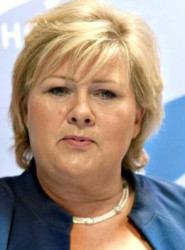OSLO (Reuters) – An anti-immigration party in Norway’s coalition government headed for its worst election result in 22 years in a local vote yesterday after its opposition to Syrian refugees put it out of step with many voters.
The right-wing Progress Party had 9.7 per cent with 87 per cent of the votes counted, against 16.3 per cent in a parliamentary vote in 2013. It was Progress’ worst election since receiving 6.3 per cent of the vote in 1993.
The election was also a blow to the Conservative Party, the senior partner in the two-party government which came to office in 2013 and has struggled with falling prices of oil, Norway’s main export, and rising unemployment.
The Conservatives’ share fell to 22.4 per cent, down 5.6 percentage points from four years ago as voters swung left.
Progress had sought to turn the municipal election into a vote on a Norwegian plan it opposes to take in 8,000 Syrian refugees by the end of 2017, arguing locally elected politicians could refuse to accept them.

“Normally the immigration debate would have been a good thing for the Progress Party, but this is not a normal debate because the catastrophe is so huge and the scenes we see unfolding so terrible,” said political scientist Svein Tore Marthinsen.
Many Norwegians swung to a more welcoming mood towards refugees, especially after the body of drowned Syrian toddler Aylan Kurdi was pictured washed up on a beach in Turkey this month.
Many other parties argued that Norway, one of the richest nations in the world thanks to its income from offshore oil and gas, should allow refugees to settle in the country.
The main opposition Labour Party, which favours letting in refugees, was the big winner yesterday with 33.4 per cent, its best result in a local election since 1987.
“Norway will help, receive and give protection to those who are fleeing from war and terror,” party leader Jonas Gahr Stoere told supporters.
“The majority that gave Norway a government of the Conservatives and Progress (in 2013) is gone,” he said.
Last night, Progress Party leader and Finance Minister Siv Jensen reaffirmed the party’s policy of helping refugees in the region around Syria, rather than letting them come to Norway.
“That’s the only way we’ll manage to do something about the flows we’re seeing,” she said.
Both Progress and the Conservatives have also been under pressure from voter perceptions that tax cuts since they took power in 2013 have mainly favoured the rich. Their bad result could strain their coalition.
Still, Prime Minister Erna Solberg expressed confidence of compromises with Progress and that the party would be able to say “I’ll be back” at the next election.
On Syria, her Conserva-tives in June teamed up with opposition parties led by Labour to agree on the plan to accept 8,000 Syrians, overruling the Progress Party.




